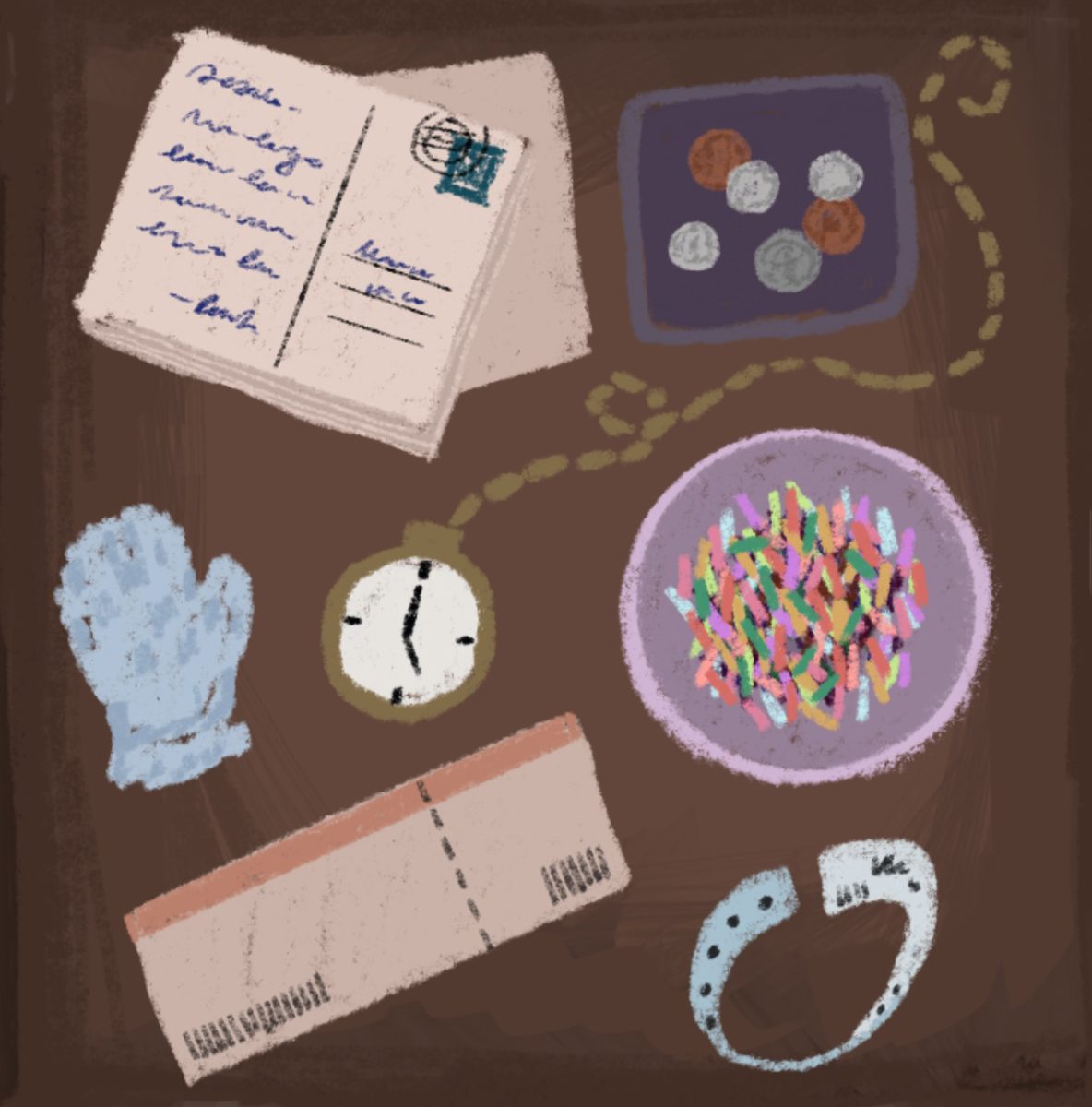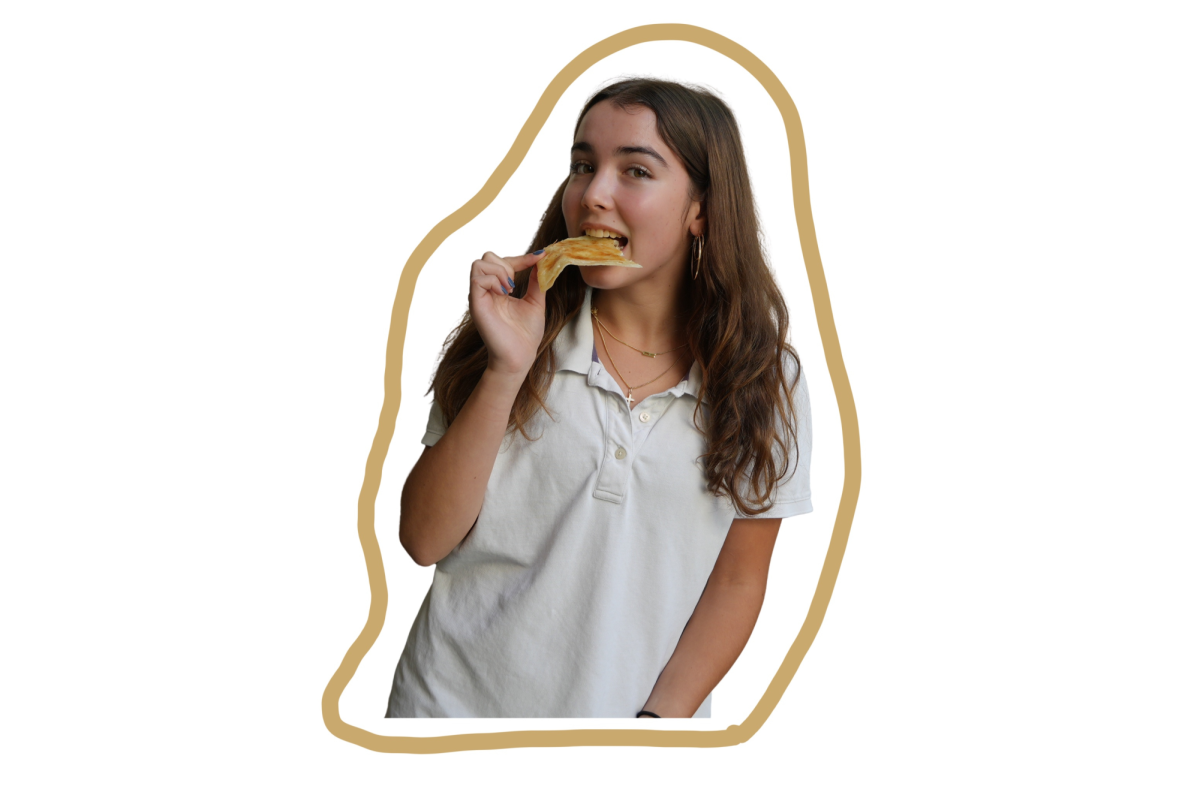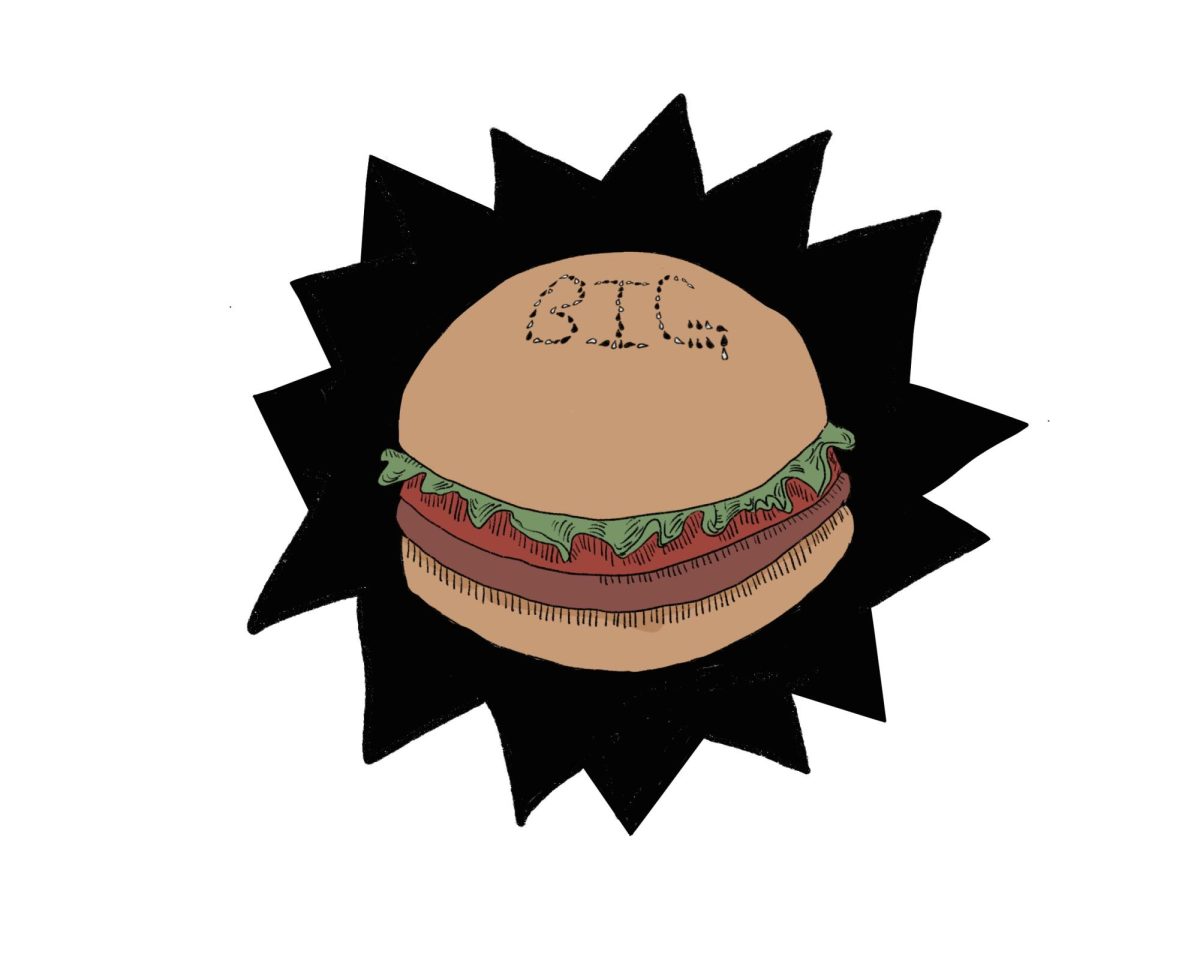What is Nostalgia?
“In a box under my bed, I keep old baby teeth, my hospital bracelet from when I was born, family heirlooms and even sprinkles from the Museum of Ice Cream,” Ophelia ’25 said. “I will never get rid of them.”
Ophelia is one of millions of people who keep miscellaneous objects in scrapbooks or keepsake boxes. But what motivates us to keep these things? Nostalgia.
In 1688, Swiss medical student Johannes Hofer combined the Greek words “nostos” (meaning “homecoming”) and “alga” (meaning “pain”) to create the term “nostalgia.” At the time, he used it to describe an illness that afflicted his patients who lived far from home and experienced an obsession, sometimes a physically painful one, with returning home.
Today, nostalgia is no longer seen as a malady, but rather “a wistful or excessively sentimental yearning for return to or of some past period or irrecoverable condition,” per Merriam-Webster.
In a survey sent out to the student body, 47.4% of 57 students said that they feel the most nostalgic in certain locations.
“Over the summer I did a lot of activities in certain summer programs that were so much fun,” Brooke ’27 said. “Whenever I come back to those locations, I miss those memories of living in the present. So, yes, it can be the people, but it’s the place I feel the most nostalgic.”
Nostalgia comes in two forms that are outlined in Svetlana Boym’s 2001 book “The Future of Nostalgia.” The first is restorative nostalgia, a desire to return to the past. The second is reflective nostalgia, a desire to reminisce about the past when it cannot be recreated.
For Ophelia, restorative nostalgia might make her want to buy a ticket to the Museum of Ice Cream, while reflective nostalgia would encourage her to talk about old memories with her mom or look through her box of treasures.
In recent years, products that transport people to the past have sold at exponential rates. In particular, The New York Times reported the large number of sales of vintage personal computers (PCs) in 2020. For the most part, people do not buy PCs for practical use, but for the joy of rebuilding outdated devices.
For many PC users, these gaming desktops serve as a time machine to the past.
“You get into this mindset of what it must’ve been like to be somebody in the late ’70s, having spent thousands of dollars on this thing that barely does anything more than a calculator,” YouTuber Clint Basinger said.
So, why do we feel so nostalgic these days?
Krystine Batcho, a psychology professor at Le Moyne College, said to National Geographic that nostalgia provides people with a feeling of control over their identity as well as their purpose in life. With a rise in viewership of reboots and other nostalgia-based media, National Geographic said that nostalgia gives people “a sense of warmness, fondness and belonging.”
Additionally, reminiscing about the past allows people to feel comfort during times of crisis.
Many people turned to their childhood activities during the pandemic. In Illinois, New York, Louisiana, Florida and Georgia, makeshift and large-scale drive-in movie theaters opened during lockdown according to ABC. Mary Widdicks is a single mom from Illinois who entered quarantine in 2020 with her three children and six pets. In search of a break from her house, Widdicks went with her family to the 1950s-themed Harvest Moon Twin Drive-In.
“The first time I went to a drive-in, I was 9 years old, exactly the age of my oldest now,” Widdicks said to National Geographic. “There was something incredibly comforting about telling my kids stories about how I’d done something exactly the same when I was their age.”
Despite the comfort that nostalgia may bring to people, some think that it does not serve any purpose at all.
In particular, excess nostalgia can be detrimental to those experiencing loneliness.
Loneliness has long been linked to nostalgia. A 2006 study done by the Journal of Personality and Social Psychology showed that when people feel negative or lonely, nostalgia is triggered as a form of escapism. This sense of nostalgia often manifests in people reminiscing about critical life events or their exchanges with people they have close relations to.
In 2023, U.S. Surgeon General Vivek Murthy said those facing loneliness should join volunteer groups or religious organizations, rather than spending time reminiscing about the past. The National Institute of Aging said people should spend time becoming acquainted with their neighbors to deal with loneliness.
Vox Senior Reporter Allie Volpe said that asking people to reminisce about the past is not favorable for all people.
While some may find solace in creating in-person connections that resemble their past experiences, for others, recreating these close connections could do more harm than good. Due to discrimination, or access to community groups, amicable ties with one’s neighbors have not always been possible for all Americans, especially members of older generations.
“This perspective, of course, flattens history, and fails to account for the ways that racism, segregation, homophobia and other acceptable forms of exclusion often kept marginalized people deeply isolated,” Volpe wrote in a Vox article.
Additionally, nostalgia has not always been widely accepted in academic fields. University of Edinburgh Historian Agnes Arnold-Forster hid her deep sense of nostalgia for 1950s Britain due to many historians’ dismissal of the feeling.
“Professional historians tend to have a low opinion of nostalgia and, at first, I absorbed this view,” Arnold-Forster wrote in an article for The Guardian. “Nostalgia is, for many academics, a hallmark of history amateurs — more the preserve of re-enactors, hobbyists and popularisers.”
More so, scholars like British sociologist Yiannis Gabriel find little importance in recounting the past in order to move forward.
“At a time when ‘innovation,’ ‘creative destruction’ and ‘disruption’ are lionized as universal virtues, mulling over the past seems decidedly passé,” Gabriel said to the Oxford University press in 2020.
Politics of Nostalgia
Despite nostalgia’s critics, it continues to infiltrate America, specifically our politics.
Historically, presidents have used nostalgia to secure their seat in office. In 1968, Richard Nixon won on his campaign to “restore respect for America around this world.” When Ronald Reagan was elected in 1980, he pledged to reinvigorate “the American tradition of leadership.” In 2016 and 2024, former President Donald Trump was elected and later re-elected into office with his campaign slogan, “Make America Great Again.”
Bloomberg Business Deputy Editor Mark Milian wrote that Trump won through his campaign as a challenger, instead of an incumbent, harking on nostalgia to win.
“One of the most powerful devices in politics — and in business — is nostalgia,” Milian said. “But nostalgia is a challenger’s tool. An incumbent can’t say, ‘Don’t you wish things were the way they used to be?’ That isn’t a winning strategy for the person already in charge.”
Nostalgia not only impacts the way populations engage with politics and business but also significantly shapes the media they consume, influencing trends like reboots and sequels that capitalize on past emotional connections.
Nostalgia Baiting
“Deadpool & Wolverine,” “Gossip Girl” and “And Just Like That …” are all evidence of the recent increase in reboots and new adaptations of classic storylines over the past few years. This is a part of a growing trend in Hollywood and in marketing at large: nostalgia baiting.
The Lamron, the student newspaper at the State University of New York at Geneseo, defines nostalgia baiting as an “attempt to gain viewership by tempting them with characters, settings or franchises from their childhood.” It is an effective marketing strategy that uses nostalgia, emotional connection and the comfort of a throwback to reach consumers. The media has often used nostalgia as a strategy to entice audiences, relying on viewers’ fond memories of their pasts to capture their attention. While this phenomenon dates back to the late 1900s, it has gained significant traction over the past few years.
The rising trend of nostalgia-focused marketing is tied to a growing desire for comfort and familiarity, especially during challenging times. For example, a 2022 American Psychological Association study found that consumption of nostalgic media increased during the COVID-19 pandemic. The researchers concluded that people turned to nostalgia as a coping mechanism to deal with the stress and loneliness of lockdown. Companies recognized this trend and adapted quickly by putting out a wave of reboots, sequels and spin-offs of beloved franchises.
A survey sent to the Marlborough student body revealed the significant impact of nostalgia on media consumption. More than 30% of 57 students reported feeling the most nostalgic when watching childhood television shows, indicating a strong market for older media. Additionally, 40.4% of respondents stated that they balance nostalgic content with newer offerings.
According to Fast Company, reboots and sequels are not just about revisiting beloved stories, they also capitalize on the collective desire to return to the “good old days,” an idealized time in hindsight but probably not as perfect as people remember.
“Familiar media from our past brings us emotional comfort, but it also meets a cognitive need: It encourages the belief that things will get better because they’ve been good before,” Batcho, a psychology professor at LeMoyne College, told National Geographic.
Reboots are textbook examples of nostalgia baiting. Though the levels of success differ for each adaptation, they have sparked immediate buzz among fans, largely because of the emotional weight and excitement associated with their original versions. For many reboots, it is difficult for producers to modernize the characters’ lives and address today’s social issues while keeping the plot and integrity of the show similar to the original, leaving many fans disappointed.
“I loved the original ‘Gossip Girl,’ but I think it was hard to reboot because the original characters like Blair, Serena, Chuck, Dan and Nate were so loved and were a big part of the plot,” Ava ’25 said.
The survey data supports this sentiment, showing that Ava is not alone in her opinions. In fact, 72.0% of students believe that originals are always or mostly superior to reboots, while only 3.6% feel that reboots always surpass the originals.
So, why does this approach so often fall flat? A significant reason for the romanticized nature of nostalgia is the concept known as “rosy retrospection.” Coined by Terrence Mitchell of the University of Washington and Leigh Thompson of Northwestern University. This term is widely accepted by psychologists. It describes the tendency to glorify the past and embellish memories, making them seem better than they actually were. As The New York Times explains, this occurs because we often filter out the mundane or unpleasant aspects of past experiences, focusing instead on highlights that brought joy. This creates a skewed perception of what the past was truly like.
“We romanticize a lot of our past, so a reboot of a beloved show will usually have very high standards from people who remember the original show at its best,” Jada ’25 said.
As a result, reboots don’t always meet expectations. Audiences approach them with heightened expectations, only to be disappointed when the new version fails to meet the bar set by the originals. Instead of offering fresh narratives, many reboots recycle old plotlines and callbacks, leaving fans feeling as if these projects are more profit-chasing rather than creative.
“Reusing a concept instead of doing something new isn’t as fun,” Jada said.
Though more well-received and more successful in terms of profit than other nostalgia-driven content, “Deadpool & Wolverine” brought back Hugh Jackman as Wolverine despite his retirement from the character in “Logan.” This was a calculated move to tap into the actor’s iconic portrayal and the audience’s nostalgic attachment to him. To heighten the appeal, the movie featured music from the late ’90s and early 2000s, further transporting fans back to an era they remember fondly. But these tactics, while emotionally compelling, risk making the result feel hollow if they don’t offer substance beyond nostalgia.
Many of these reboots and continuations falter when it comes to recapturing that special spark from the past, leaving audiences feeling unsatisfied and yearning for something more. Rather than presenting audiences with new shows or nuanced character developments, the projects often revert to overused plotlines that cause viewers to perceive the result as hollow.
“Honestly more often than not, I find myself going back to the shows that I associate with my childhood, but typically, it doesn’t leave me feeling good, it leaves me missing a life that I viewed through rose-colored glasses,” Ava ’27 said. “I can appreciate nostalgia for it does evoke strong feelings, but at the end of the day, I think it’s better to live in the moment.”








